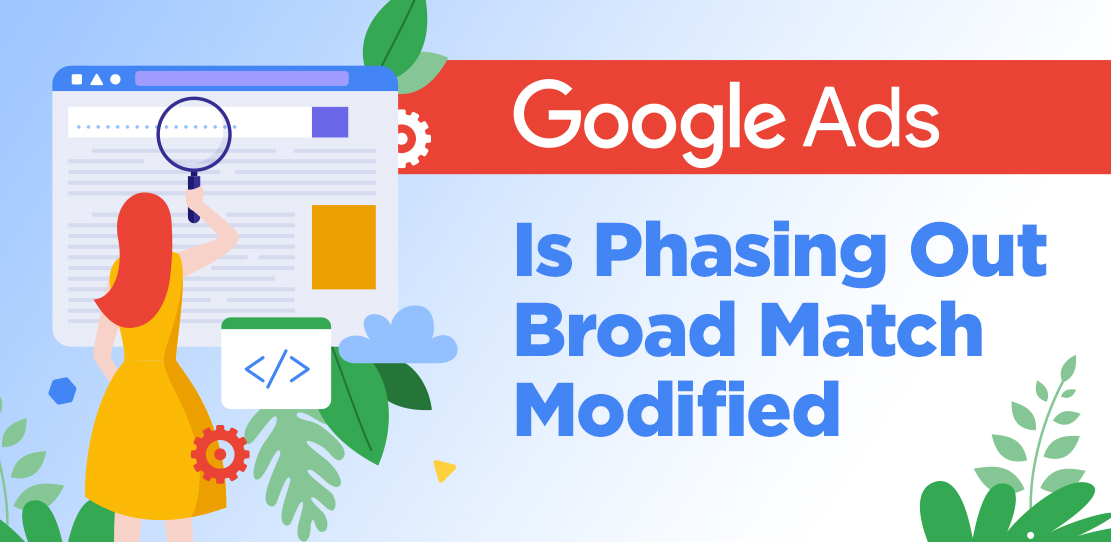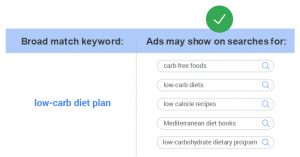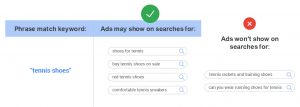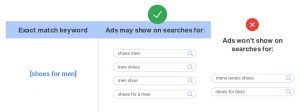
Earlier this month, Google announced a series of changes to their keyword match types. Most notably, that they were phasing out broad match modified starting February 18, 2021.
The changes have caused quite a stir within the marketing community. We’re covering everything you need to know from a quick refresher on keyword match types to what changes you’ll need to make to your Google Ads campaigns.
A Brief History of Match Types
To give you an idea of the scale of changes, it’s important you understand the existing types of keyword match types within Google Ads search campaigns. The previous existing match types included broad match, broad match modified, phrase match, and exact match.
The names are a dead giveaway for what each type of match type covers, but we’ll briefly remind you.
Broad Match
If you opt to use broad match keywords, your ads can appear for a wide variety of target searches. This includes queries related to your keyword, that don’t contain all the components of it.
As the name suggests, it lets you target a broader audience. But you’ll likely end up appearing for irrelevant queries.

Broad Match Modified
Because of the large scale of queries, you could potentially appear for when using broad match type, Google introduced broad match modified to rectify this.
This lets advertisers add “+” to their broad match keywords. This symbol would tell Google that those words must be within a query to trigger the ad. Additional words could also be included in the query, but specific words had to appear to trigger your ad.
Broad match modified gave more control over using broad match type for advertisers. While still allowing them to appear for a larger audience. It often allowed for campaigns with great click-through and conversion rates.
Phrase Match
You can use phrase match by annotating your keywords with quotations around your keyword within your ad campaign. Doing this means only these keywords in this order would trigger your ad.
It sounds similar to broad match modified, but for that match type, the words could appear in any order, so long as they appeared.
Phrase match has changed a lot over the years. Back in 2014, Google included close variants within matches. So if a query had plurals, misspellings, and so on, your ad could still be triggered.

Exact Match
You can use the exact match by annotating your keywords with square brackets [like these] when setting up a search campaign. This annotation lets Google know you only want your ad triggered for an exact match to your keyword.
It limits your overall audience, but it can improve click-through rates and conversions because the search intent is better matched.

What Happens to Broad Match Modified?
As we said in the introduction, broad match modified is being phased out as of February 18th, 2021. It’s being combined into the phrase match type. So you’ll only have the option of broad match, phrase match, and exact match now when setting up Google Ads campaigns.
Google says the change is good and it will bring the best of broad match modified into phrase match type. They claim their algorithm better understands queries and search intent now. As such, the state broad match modified and phrase match keywords often overlap and serve for the same queries.
The Google Ads Support article in which they made the announcement says the good news doesn’t end there for advertisers. The change will apparently make it easier to manage keywords within your account and allow advertisers to have more control.
Although the change takes place on February 18, you don’t need to rush to change everything if you’re using broad match modified keywords.
You can still create broad match modifier keywords within the Google Keyword Tool by using the plus symbol. Google says this will run until July when they’ll roll out the changes globally. They’re releasing additional tools over this time period to help advertisers convert their keyword match types.
Is It Really All Good News?
While Google claims this is all great news, the PPC advertising community isn’t so sure. Many of them see this as yet another push by the technology giant toward automated or smart campaigns.
Industry experts predict advertisers may see large fluctuations in their campaign analytics throughout this transitional period. This could come in the form of both beneficial fluctuations and potentially negative ones.
So where does that leave you? We’ve got some helpful tips on how to manage the change.
Follow Google’s Recommendations
It’s so important that you keep an eye on the recommendations that Google makes within your Google Ads account. In particular, any recommendations to remove duplicate keywords or add new keywords.
The latter is vital, because as phrase match keywords change, you may need to add in new keywords to reach the best potential audience.
Invest in Negative Keywords
You should already have a negative keywords list going, but it will be vital to keep on top of this as phrase match and broad match modified amalgamate.
Phrase match keywords are going to be opened up to more potential traffic than before. So keep a keen eye on any potential negative keywords to add to these campaigns.

Check Your Account Structure
The changes to the match types are likely going to affect your paid search traffic. This will, in turn, affect your spending.
It could be good news for some advertisers as they see more targeted traffic come through. But it could be bad news for others. This is why it’s so important that you keep a keen eye on your budgets across your campaigns and adjust them as you need to.
This is especially true if you structure your campaigns or ad groups by match type. You’ll need to begin allocating more of your budget towards phrase match campaigns or groups.
Keep up to Date
One of the best things you can do is stay up to date with Google’s ongoing announcements regarding these changes. You can do that by following industry experts, as well as checking in with Google Ads Support Announcements frequently.
Trust the Experts
If all the changes sound a little overwhelming, don’t worry. Google is always changing with the times and PPC experts, like ourselves, have years of experience in implementing changes to keep with the times. Broad match modified ads may be gone, but they’ll no means be the last change Google makes.
If you need help or advice with managing your PPC campaigns, just get in touch.
Learn More About Our Google Shopping Management Schedule A Call Today





